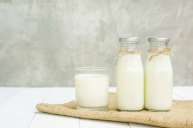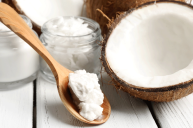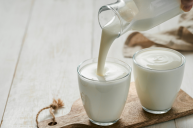Americans have been told for a long time now that low-fat food is better for us, especially when it comes to dairy foods. Low-fat dairy products have recommended for years as the best way to drink milk and eat foods like yogurt and cheese. But new research concludes that eating yogurt and cheese as part of a healthy diet may actually protect us from a variety of diseases.
In new research presented at the annual congress of the European Society of Cardiology, scientists outlined their findings on the connection between dairy products and coronary heart disease, cerebrovascular disease, and cancer.
According to a news release issued by the society, "The consumption of dairy products has long been thought to increase the risk of death, particularly from coronary heart disease, cerebrovascular disease, and cancer, because of dairy's relatively high levels of saturated fat. Yet evidence for any such link, especially among US adults, is inconsistent."
The study was led by Dr. Maciej Banach from the Department of Hypertension at the Medical University of Lodz, Poland. Banach said, "A meta-analysis of 29 cohort studies published in 2017 found no association between the consumption of dairy products and either cardiovascular disease or all-cause mortality."
Banach and the team of researchers looked at 29 studies, including data from the 1999-2010 National Health and Nutrition Examination Survey, conducted by the U.S. Centers for Disease Control and Prevention, which followed 24,474 adults, as well as another set of studies with 636,726 participants who were followed for approximately 15 years. In other words, this study isn't a small, one-off look at the effect of low-fat dairy products.
And although it may sound like their conclusion goes against past science, new research has been trending this way. It's not the research in the past was wrong, but scientific studies are set up tend to be influenced by what we think we know. In studies conducted in the 70s and 80s, we learned that high fat diets were bad for people (something that has held—eating a diet high in saturated fat is bad for humans), so many later studies on things like low-fat dairy products started with the assumption that fat is bad.
Another thing that influences the outcome of studies is that they tend to focus on one thing, ignoring, for example, one negative effect from full-fat dairy products may be outweighed by several other positive health benefits, including vitamin D and calcium intake.
In an article titled "Dairy Fats and Cardiovascular Disease: Do We Really Need to Be Concerned?" a group of researchers said, "Nutritional research traditionally has followed a reductionist, nutrient focused approach that evaluated the effect of a single nutrient group linking one nutrient to one health effect."
This broad study found that consuming any kind of dairy food was associate with a two percent lower risk of death from any one cause. That number jumped to eight percent when the dairy consumed was mainly cheese. People who ate dairy were found to have a four percent lower risk of death from a stroke, which rose to seven percent lower with only milk consumption.
Even Banach's conclusion finds some contradictory evidence that needs more study. He said, "Yet a large 20-year prospective study of Swedish adults, also published in 2017, found that higher consumption of milk was associated with a doubling of mortality risk, including from CVD (cardiovascular disease), in the cohort of women."
Even though additional study is needed, the conclusion of the research shows that dietary guidelines can be relaxed when it comes to yogurt and cheese. Banach said, "In light of the protective effects of dairy products, public health officials should revise the guidelines on dairy consumption. And given the evidence that milk increases the risk of CHD (coronary heart disease), it is advisable to drink fat-free or low-fat milk."
Bottom line is, high-fat dairy products like cheese and yogurt aren't inherently bad for you and, in fact, you may be losing some good benefits by avoiding dairy or by sticking to only low-fat dairy products (except when it comes to plain milk). However, researchers caution, this guidance doesn't mean you can have a cheese board for every meal or high-fat dairy foods with lots of added sugar. Moderation and healthy choices are still the key; if you eat enough dairy to gain weight, the protective benefits will be lost to the negative effects from carrying extra body weight.




